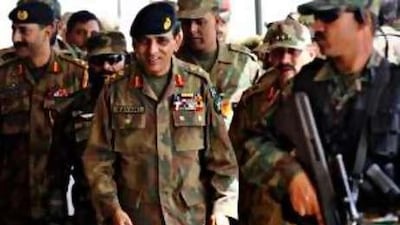MUMBAI // The impasse in cross-border dialogue between India and Pakistan has created such frustration in Delhi that some observers and Indian diplomats are entertaining the largely fanciful idea of initiating talks directly with the Pakistan's powerful military and intelligence service.
It would, to say the least, be unorthodox for the Indian government to bypass its democratically elected counterpart in Islamabad to enter direct talks with top officials of the military and Inter-Services Intelligence (ISI) there. Yet it is a measure of the discontent in Delhi with the lack of progress in advancing India-Pakistan ties - and appreciation for the influence that these two institutions wield in Pakistan - that the idea is being floated anyway.
"Who controls the ISI? Who calls the shots in Pakistan?" said a diplomat in India's foreign ministry, summarising what many in India and elsewhere perceive as the balance of power in the Pakistan. "The [Pakistani] army is the real epicentre of power, not the civilian government." The dissatisfaction over the state of India-Pakistan ties stems from last month's breakdown of talks between the two sides. On June 15, SM Krishna, India's external affairs minister, travelled to Islamabad to revive peace talks that stalled after a grooup of Pakistani militants killed 163 people in Mumbai in November 2008. After six hours of closed-door negotiations with his Pakistani counterpart, Shah Mehmood Qureshi, talks collapsed in disagreement over the issue of terrorism.
Prospects for the talks were not helped by a statement issued on the eve of the dialogue by India's home secretary GK Pillai, which asserted that the ISI had played a "much more significant role" in the Mumbai attacks than previously thought. The Indian diplomat, who spoke on condition of anonymity, said he had communicated to Mr Krishna before the talks that their progress hinged on the involvement of the Pakistani army.
New Delhi had been negotiating with General Pervez Musharraf who won power after a military coup in October 1999. Although he was widely distrusted and called the "architect" of the Kargil war, the third armed conflict between both nuclear rival nations in May 1999, Indian officials say in their dealings with Mr Musharraf they came very close to a final agreement with Pakistan on the issue of Kashmir.
But he was ousted from power after a judicial crisis erupted in 2007. Many in India would like to a engage in a similar way with Gen Ashfaq Parvez Kayani, the chief of Pakistan's army. Now, some Indian observers want more than the involvement of Pakistan's military in talks. They want to exclude Pakistan's government altogether. "Is there any point talking to [Pakistan's foreign minister] Shah Mehmood Qureshi?" Barkha Dutt, a well-known talk show host with New Delhi Television, wrote in a column last week in the Hindustan Times, an Indian daily. "Do we really believe he is empowered to take action against sections of his country's military or intelligence apparatus? If Pakistan's army chief - who has just driven home his influential indispensability with a three-year extension - can be part of the strategic dialogue with Washington, what stops us from talking directly to the people who matter?" Dutt wrote.
But the view is unlikely to be entertained on the other side of the border. Mehmal Sarfraz, the op-ed editor of the Daily Times, a Pakistani newspaper, calls the Indian perspective "naïve". Negotiating with the military is tantamount to "undermining Pakistan's democratically elected government", she said. "Pakistan is a nascent democracy" compared to India, she added, but the country's civilian government is "not absolutely powerless".
She admitted that Pakistani foreign policy matters concerning Afghanistan and India were "dictated by military circles", but she added that the "civilian government also has a say in them". Hamid Gul, a former chief of the ISI, expressed outrage over the debate brewing in India. "The military is quite strong in Pakistan," he said. "But politicians speak the same language, albeit in a softer tone. He said the Indo-Pak talks stumbled not because Pakistan's civilian government is weak, but because of India's refusal to address the "core dispute" of Kashmir in the dialogue process.
Ashok Mehta, a retired Indian army general based in New Delhi rejected the possibility of India negotiating directly with the Pakistani military. "When a civilian government is in place, you cannot talk to the military," he said. But he said in order to reduce the Indo-Pak trust deficit, it was imperative to activate channels of communication between the military and intelligence establishment of both countries.
"The Indian army should be allowed to actively communicate with the Pakistani army. Raw [Research and Analysis Wing of India's intelligence agency] should communicate with the ISI," he said. "These channels have never before been activated, but it's time to start thinking out of the box." @Email:achopra@thenational.ae

